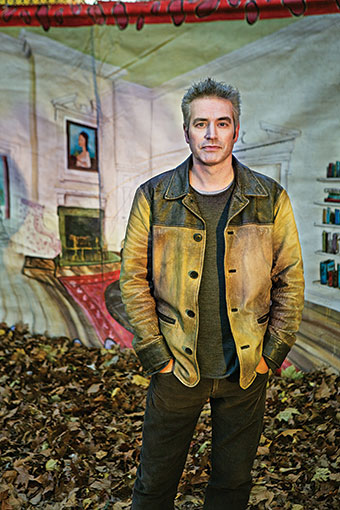Next story: Not Your Typical Teenage Female Assassin
Wesley Stace, Considered as a Novelist
by Buck Quigley

A conversation with the songwriter/novelist, also known as John Wesley Harding, who comes to Nichols School on Wednesday, April 13
Wesley Stace (a.k.a. John Wesley Harding) emerged on the music scene in 1990, with the release of Here Comes the Groom. The record—which featured a backing band that included Pete Thomas and Bruce Thomas of Elvis Costello’s group the Attractions, and California songwriter/guitarist Dave Alvin, among others—generated considerable excitement on both sides of the Atlantic. The strength of his lyrics and catchy melodies earned him a legion of fans, and he’s released some 20 records since then.
That alone would seem like a lot of creative output for most artists. But Stace is not like most artists.
In the meantime, he has been building an enviable reputation as a novelist. On Wednesday, April 13, he will read from his third and most recent book, Charles Jessold, Considered as a Murderer, at 7pm in the Nichols School Albright Hall Reading Room. The historical novel is set against the backdrop of the British folk music revival that took place in England during the buildup to World War I, and examines the relationship between a fictional composer and his most supportive critic. The dialogue is crisp and darkly witty, and Stace displays an innate ear for the tone of the era, right down to the fictional newspaper account of the grisly murder-suicide scene that begins the story.
The author spoke to us by phone from his Philadelphia residence, the morning after returning from a family visit with his kids to Granny’s house in Hastings, England. Despite having lived in various American cities for the past 21 years, his British accent remains intact, and he still thinks of Hastings as home.
Considering his background as a musician, and reading his erudite descriptions of various musical movements in the book, it seemed reasonable to ask about his background—had he had any musical training growing up?
“None,” he says, laughing. “I grew up in a very musical family. One of my sisters is singing opera in Italy at the moment. Another is in cabaret and stuff in Vienna. My dad played piano and organ. My mum was an opera singer, and she’s now a singing voice teacher. So there was a lot of music around. But formal music education, I didn’t really have at all.”
His thorough research in preparation for the novel must be left to explain how he so convincingly transports the reader into the world of early 20th-century English musicophiles. Despite that diligent work, getting the book published also proved a bit of a chore.
“It was rejected by 12 publishers—oh, I don’t know how many, but a bunch—because it was too English, it was about folk music, people weren’t interested in an historical novel. And of course, now it’s come out, and it’s gotten such a fantastic response from the press in America. And I know that doesn’t mean those publishers aren’t wrong, but what it means is that, you know, things can connect with people. Americans are spending their Sunday evenings watching Masterpiece Theatre. And America had a massive folk song revival with Alan Lomax and stuff like that. In fact, English people discovered most of the great folk songs in America because industrialization had already happened in England, and there weren’t a lot of folk songs. People would go out into the field to discover songs, and people in the fields would sing them Gilbert and Sullivan.”
How does the process of writing a song compare to that of writing a novel for Stace?
“You know, writing songs and playing music is collaborative, fun, performed in public, possibly soon after the act of creation,” he says. “It can lead to drinking, and making friends with people, and hanging out with old friends—and it’s a very joyful experience,” he reflects.
“Writing [a novel] is solitary, sad, lonely—as you know—and disgusting, and very unpleasant, basically. It’s just not a great, fun thing to do.” He laughs at that description, and adds, “I’m very lucky to have both those things to balance with each other, and I don’t know how other people do it. It would be very depressing. That’s why I like going to festivals and doing readings and such—just to get out of the house.”
Stace rarely blends his appearances as an author with his role as a musician, although he promises to bend that rule at Nichols, where he’ll perform the English ballad of “Little Musgrave.” The song is recognizable to some as “Matty Groves,” as performed by Fairport Convention, and it is a key to understanding the novel.
There have been other exceptions when he’s broken his own rule about wearing multiple artistic hats at once. Recently, in his role as artist-in-residence at Fairleigh Dickinson University in New Jersey, he arranged a performance by himself, ex-poet laureate Robert Pinsky, and his old friend Bruce Springsteen for 300 enthralled students. Springsteen played acoustic guitar and sang versions of “Born to Run” and “Darkness on the Edge of Town.” Stace joined in on a duet of Springsteen’s haunting “Wreck on the Highway.”
How did he come to know Springsteen? “I was standing next to him at a gig, and I said hello. And he’d heard of me.” He pauses. “That was even better!”
Fans of music and literature alike should recognize Wednesday’s reading as an excellent opportunity to get to know the musician John Wesley Harding—in his role as himself, Wesley Stace, novelist.
—buck quigley
blog comments powered by Disqus|
Issue Navigation> Issue Index > v10n14 (week of Thursday, April 7) > Wesley Stace, Considered as a Novelist This Week's Issue • Artvoice Daily • Artvoice TV • Events Calendar • Classifieds |









 Current Issue
Current Issue